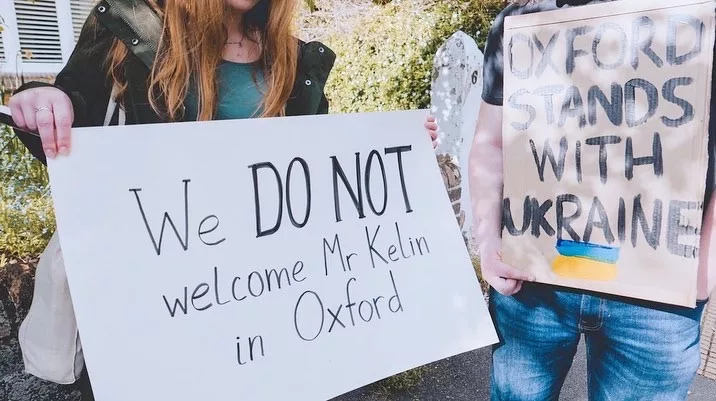Speaking at the Oxford Russian Club, the Russian Ambassador to the UK, Andrey Kelin, downplayed the brutality of Russian military action in Ukraine and said that refugees in Oxford who have fled the violence may return home if they want to, but would likely be conscripted into the Ukrainian forces.
Kelin, who is banned from entering Parliament’s Westminster estate, suggested that it is the responsibility of the West to stop supplying the Ukrainian armed forces with weapons before peace can come to Ukraine and refugees can permanently return to their home country.
“We are not responsible”, Kelin said. “We are trying to diminish the size of the Ukrainian war machine […] either they can continue casualties, or they can stop immediately.” The ambassador continually presented the origins of the conflict in Ukraine as relating to the emergence of “militant [Ukrainian] nationalism” and the suppression of the Russian language.
When asked about possible resolutions to the conflict, Kelin said that the last time there had been “sensible” negotiations between the two countries was in April 2022, as the team sent by Ukraine had been “prepared for a compromise, especially in security”. But, he claimed, these negotiations had stopped suddenly on the back of US pressure and after the Bucha massacre, which he suggested might have been “artificially staged”.
As documented by the UN Human Rights Monitoring Mission, 458 bodies, at least 19 of which were children, were recovered from Bucha in April 2022. The massacre came as part of the Russian effort to occupy the town which lies just outside Kyiv, and involved the summary execution of at least 73 civilians.
Kelin has also been criticised for previously denying that Russia bombed a theatre in Mariupol housing civilians. The Associated Press reported that 600 people died as a result of the strikes on the theatre. A maternity ward, containing children, was also the subject of air strikes in Mariupol. The governor of the Donetsk Oblast said that 17 people were injured in the bombing, including women in labour.
In response to questions concerning the future of Russia’s geopolitical status within Europe, Kelin said that “Russia is a European country”. While “temporarily [Russia] will have to rely on China”, he seemed sure that “sooner or later we will have to reconcile our differences”, although Russia “will not take the initiative” on this. Such a reconciliation would rely on “another European architecture” which would consider “the interests of all on the continent, not just NATO and European Union members”.
The Russian Club event was met with protest from demonstrators who congregated outside the venue, many of whom were draped in the Ukrainian flag. Several held signs and banners, one of which read “Kelin represents murderers”. One protester, Anna Hope, denounced “giving a platform” to Kelin and the Russian government. She also spoke about raising the visibility of the war in Ukraine for those who are not personally connected to it, worrying that “people have learned to tune out news about Ukraine”.

During the talk, the ambassador continually brushed over the total 9000 civilian deaths that have occurred since the Russian invasion of Ukraine, parrying the suggestion that civilians are being targeted in Ukraine with a reference to NATO bombing in Serbia in 1999. Furthermore, Kelin claimed that Russia was “now rebuilding parts of Ukraine that have been destroyed”, and would “rebuild all areas that stay attached to Russia”.
The event took place in the back living room of a house in North Oxford after two previous venues, a college and a church, cancelled. Kelin was accompanied by his own security detail and there was a police presence outside of the house. A member of the Oxford Russian Club told Cherwell that they thought forums like this with open discussion are very important and expressed frustration that the university community was not more supportive.
The University’s Graduate Scholarship Scheme for Ukrainian Refugees matriculated 26 postgraduate Ukrainian students in October 2022 and plans to fund 18 further scholarships in the next academic year. Oxford city has also welcomed hundreds of refugees since the Russian invasion on 24th February 2022.
Image Credit: Katy Okuneva for FAR Oxford


